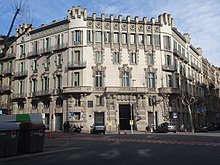
Modernisme, also known as Catalan modernism and Catalan art nouveau, is the historiographic denomination given to an art and literature movement associated with the search of a new entitlement of Catalan culture, one of the most predominant cultures within Spain. Nowadays, it is considered a movement based on the cultural revindication of a Catalan identity. Its main form of expression was Modernista architecture, but it also encompassed many other arts, such as painting and sculpture, and especially the design and the decorative arts, which were particularly important, especially in their role as support to architecture. Modernisme was also a literary movement.
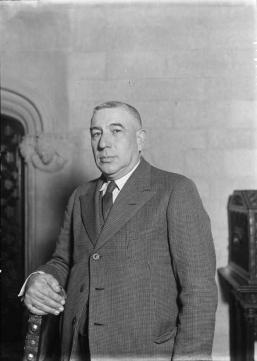
Josep Irla i Bosch was a Catalan businessman and politician. He was a deputy in the Parliament of Catalonia and the Spanish Congress in 1932, as an Esquerra Republicana de Catalunya affiliate. He was also the last President of Parliament of Catalonia at the end of Republican Catalan resistance in the Spanish Civil War, before Francisco Franco abolished the Generalitat of Catalonia. He was elected President of the Parliament of Catalonia on 1 October 1938. In office, Irla pushed for cooperation with the allies, Basque nationalists and other anti-Francoist groups, though excluding the communists. He became the President-in-exile of the Generalitat after Lluís Companys was executed. During his time as President-in-exile, he established a Government in exile, and appointed Josep Tarradellas as Conseller en Cap. He resigned as President in 1954.

Josep Tarradellas i Joan, 1st Marquess of Tarradellas was a Catalonian politician known for his role as the first president of the Government of Catalonia, after its re-establishment in 1977 under the new Spanish Constitution and the end of the Francoist Dictatorship. He was appointed the role of 125th President of Catalonia in 1954 but spent 23 years in exile until 1977 when he was officially recognised as the President of Catalonia by the Spanish Government.

The Commonwealth of Catalonia was a deliberative assembly made up of the councillors of the four provinces of Catalonia. Promoted in its final stages of gestation by the Regionalist League of Catalonia, it was strongly endorsed by municipal referendum in October 1913.

Sant Andreu de Llavaneres is a municipality located 36 km north of Barcelona (Catalonia) (Spain), along the Mediterranean coast, between Mataró and Sant Vicenç de Montalt. It belongs to the Maresme comarca and the Barcelona province. The short name is simply Llavaneres.
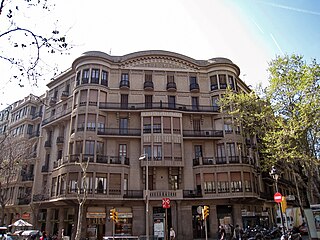
Noucentisme was a Catalan cultural movement of the early 20th century that originated largely as a reaction against Modernisme, both in art and ideology, and was, simultaneously, a perception of art almost opposite to that of avantgardists. In 1906, Eugeni d'Ors coined the term following the Italian tradition of naming styles after the centuries and using the homonyms nou (nine) and nou (new) to suggest it was a renovation movement. The same year two essential works for Noucentisme were published: Els fruits saborosos by Josep Carner and "La nacionalitat catalana" by the Conservative politician Enric Prat de la Riba.

Isona i Conca Dellà is a municipality in the comarca of the Pallars Jussà in Catalonia, Spain. It is situated in the valley of the Conques river in the south-east of the comarca. It was formed in 1970 by the fusion of the following municipalities: Isona, Basturs, Benavent de la Conca, Biscarri, Conques, Covet, Gramenet, Llordà, Masos de Sant Martí, Montodó, Orcau i Figuerola d'Orcau, Sant Romà d'Abella and Siall. The town hall is in Isona. The municipality is served by the C-1412 road between Artesa de Segre and Tremp, and is linked to Coll de Nargó by the L-511. It includes a small exclave to the south.

Àger is a municipality in the comarca of the Noguera in Catalonia, Spain. It is situated in the north-west of the comarca, and the territory of the municipality stretches between the Noguera Ribagorçana and Noguera Pallaresa rivers. The Terradets reservoir on the Noguera Pallaresa is situated within the municipality. The village is linked to Balaguer and Tremp by the L-904 road.
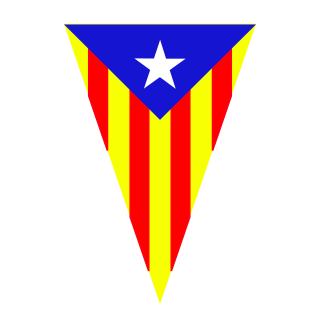
Estat Català is a pro-independence nationalist historical political party of Catalonia (Spain).

Sant Martí d'Albars is a municipality in the comarca of Lluçanès in Catalonia, Spain.

Sant Martí de Llémena is a municipality in the comarca of Gironès in Catalonia, Spain.
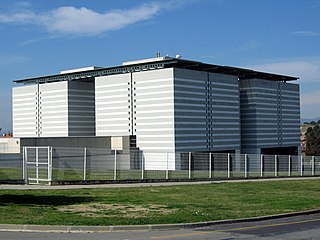
The National Archive of Catalonia, is a body created by the Generalitat of Catalonia by decree 28 November 1980. Located in Sant Cugat del Vallès, it is the Catalonia government's official archive, and holds both government and private documents relating to Catalonia's society, politics, economics and history. As government's historical archive, the ANC collects, preserves and disseminates the most relevant records of Catalonia's political and administrative activity of the departments, institutions and companies that make up the Government of Catalonia.

Josep Coll i Martí, better known as Pep Coll, is a Spanish writer. A prolific author, he has cultivated all literary genres, including journalism. His life and literary world are the Pyrenees, which have become a legendary universe. His works have been translated into several languages, including Spanish and Basque. In addition to his work as a writer, he has been teacher of language and literature.

Francoism in Catalonia was established within Francoist Spain between 1939 and 1975, following the Spanish Civil War and post-war Francoist repression. Francisco Franco's regime replaced Revolutionary Catalonia after the Catalonia Offensive at the end of the war. The dictatorship in Catalonia complemented the suppression of democratic freedoms with the repression of Catalan culture. Its totalitarian character and its unifying objectives meant the imposition of a single culture and a single language, Castillian. The regime was specifically anti-Catalan, but this did not stop the development of a Catalan Francoism that was forged during the war and fed by victory.

Miquel Badia i Capell (1906–1936) was a prominent figure of radical Catalan separatism during the days of the Second Spanish Republic, member of Estat Català and the JERC, Chief of Public Order of the Generalitat of Catalonia. He became known among his followers as Capità Collons'Captain Balls'.

Josep Enric Millo i Rocher, is a Spanish politician for PP.

Josep Dencàs i Puigdollers was a Catalan nationalist politician active in the Republican Left of Catalonia.

The Autonomous Region of Catalonia was established after the grant of self-government to Catalonia during the Second Spanish Republic (1931–1939), becoming an autonomous region within the Spanish Republic. The Generalitat of Catalonia was the institution in which the autonomous government of Catalonia was organized, it was established in order to replace the Catalan Republic proclaimed during the events of the proclamation of the Spanish Republic.
